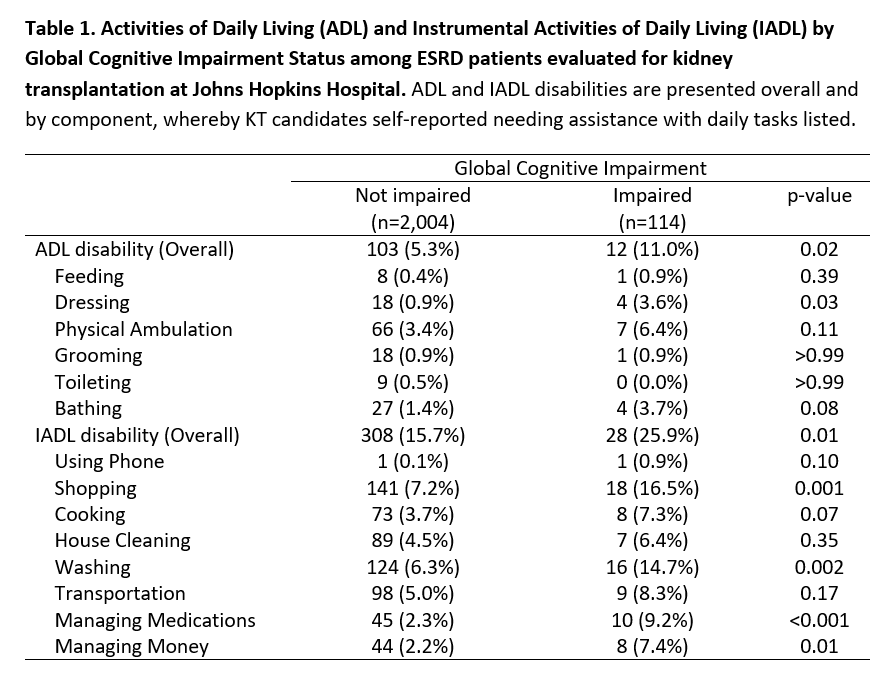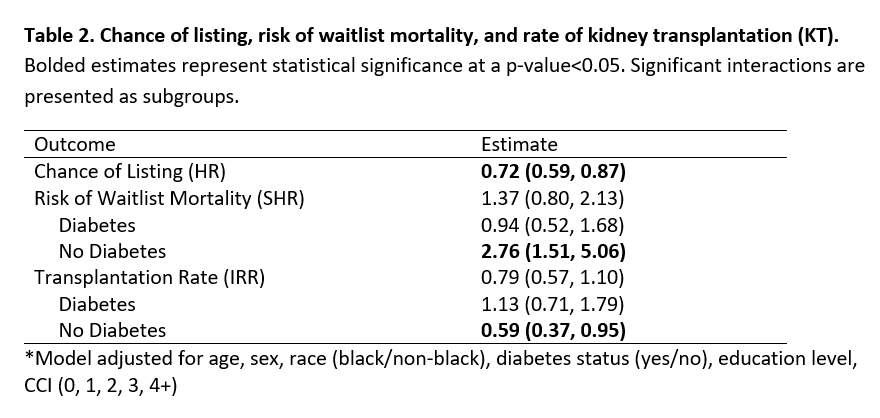Cognitive Function & Risk Of Adverse Outcomes In Kidney Transplant Candidates
N. Chu1, Z. Shi1, H. Ying1, C. Haugen1, S. Norman2, D. Segev1, M. McAdams-DeMarco1
1JHU, Baltimore, MD, 2Michigan Medical Center, Ann Arbor, MI
Meeting: 2019 American Transplant Congress
Abstract number: 240
Keywords: Graft failure, Mortality
Session Information
Session Name: Concurrent Session: Kidney Psychosocial I: Cognitive and Behavioral Factors
Session Type: Concurrent Session
Date: Monday, June 3, 2019
Session Time: 2:30pm-4:00pm
 Presentation Time: 2:42pm-2:54pm
Presentation Time: 2:42pm-2:54pm
Location: Room 302
*Purpose: With a high prevalence of cognitive impairment and underreported dementia–severe cognitive impairment that impairs activities of daily living–patients with ESRD may have reduced chance listing for kidney transplantation (KT), greater risk of waitlist mortality, and lower rate of KT.
*Methods: In a 2-center cohort study of 2,118 KT candidates (1/2009-6/2018), we estimated differences by impairment in global cognitive function (modified mini-mental state exam (3MS)<80) in time to listing, waitlist mortality, and KT rate using adjusted Cox proportional hazards, competing risks, and Poisson regression, respectively. We further assessed if associations were modified by age, sex, race, diabetes status, and disability status (activities of daily living (ADL), instrumental activities of daily living (IADL)).
*Results: In 2,118 KT candidates, the mean age was 53.9 years (13.4 SD), 41% were female, 45% were black, and 5% had cognitive impairment, of which 10.8% had ADLs and 29.2% had IADLs (Table1). For ADLs, cognitive impairment was associated with requiring assistance with dressing; and for IADLs, it was associated with requiring assistance with managing medications and money, shopping, and washing (Table1). Cognitive impairment was associated with 28% lower chance of listing (HR=0.72, 95%CI:0.59-0.87). Overall, cognitive impairment was not associated with waitlist mortality or KT rate (Table2). However, in candidates without diabetes, those with cognitive impairment were at 2.76 times greater risk of waitlist mortality than those without cognitive impairment, while in those with diabetes, there was no association (Table2). In candidates without diabetes, those with cognitive impairment were less likely to undergo KT, while in those with diabetes, there was no association (Table2). Age, sex, race and ADL/IADL did not modify associations with waitlist mortality and KT rate.
*Conclusions: Cognitive impairment is associated with lower chance of listing and reduced rate of transplantation, and is associated with higher risk of waitlist mortality in those without diabetes. Centers should continually monitor cognitive function of KT candidates to reduce risk of adverse waitlist outcomes.
To cite this abstract in AMA style:
Chu N, Shi Z, Ying H, Haugen C, Norman S, Segev D, McAdams-DeMarco M. Cognitive Function & Risk Of Adverse Outcomes In Kidney Transplant Candidates [abstract]. Am J Transplant. 2019; 19 (suppl 3). https://atcmeetingabstracts.com/abstract/cognitive-function-risk-of-adverse-outcomes-in-kidney-transplant-candidates/. Accessed July 5, 2025.« Back to 2019 American Transplant Congress


